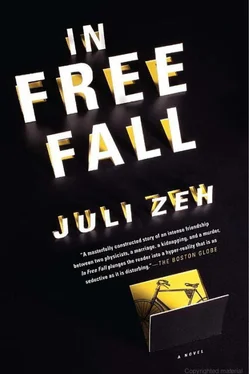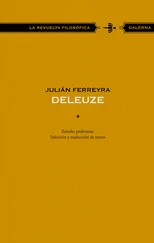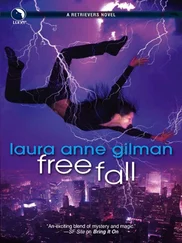The restaurant has windows all around. The dusk presses close against the panes of glass. Three tables away, a man in a suit is eating something brown with gravy, dabbing his mouth with his napkin after every bite and turning his wrist to look at his watch. Behind the next potted plant, the young woman in the pink coat is composing a long text message. All the diners in the restaurant look as though their cars are waiting outside. Without a car, Sebastian is a castaway among sea captains and will surely be recognized as such by the way he is glancing around wildly. The woman smiles when her mobile beeps. Perhaps she is waiting for a lover, with whom she will betray her husband on service-station furniture. Perhaps she calls herself Vera Wagenfort at these assignations. Strangely, Sebastian would not give a damn.
The first gulp of beer hits him like a dull thud in his arms and legs. As the shock wears off, so does the feeling that he has understood everything. Sebastian realizes that he was wrong in thinking he had fully grasped the situation. In physics, when an attempt is made to go beyond the limits of the knowable, mathematics takes over from the imagination. But the sentence “Dabbelink must go” cannot be expressed as a mathematical formula, so it stays outside the parameters of Sebastian’s understanding. This has consequences. Until now, Sebastian has looked toward the future believing that he is looking out at an open prospect. From this day onward, he will be looking down at his feet. His new world is the little patch of ground beneath his next step. He won’t run across exit ramps anymore. He will not even try to locate the perpetrators in his mind. He will simply do what is being asked of him. As cleanly as possible. Surgically. His blackmailers have chosen him because they need someone who will do the job properly. Sebastian will do everything to make sure he does not disappoint them. Resolutely he opens the newspaper to the contents page.
When the clock above the bar displays ten thirty, his mobile phone has only one bar of battery left. Almost as soon as he picks it up, a ring pierces the air. Tables and chairs crash into each other and settle down again as the woman in the pink coat stands, pressing her phone to her cheek. Nodding and talking at the same time, she walks out of the restaurant. While Sebastian is looking after her, there is another ring. He cannot muster the same sense of shock.
“Hello?”
“Sebastian, you won’t believe how beautiful it is here!”
The sharp pain in his gut had died down with very little resistance after he had sat down in the restaurant. But Maike’s voice brings back the pain. Between her words Sebastian feels he can hear his son, and he feels this so keenly that Maike must surely notice it. “In twenty-six hours, thirteen minutes, and approximately ten seconds, I’ll be with the scouts in the woods!” Sebastian has to get off the phone and conserve his battery. Maike chats about misty mountains and little lakes looking up at the sky like blue eyes. She talks about swimming pools, the sauna, and massages. Cuba libres at the bar.
“Maike!”
That comes out harsher than intended. Sebastian does not have the patience to try for a specific tone of voice.
“What’s up?” A faint reflection of his shock colors her voice.
“I have to get off the phone. The battery is low.”
“Did everything go OK with Liam?”
“He slept through the whole journey.”
“Are you back at home?”
“Almost.”
“Are you sure everything is all right?”
“Of course! Maike, the battery…”
A little jingle sounds and the display shows two intertwined fishes. Sebastian has never understood what the phone manufacturer meant to say with this symbol. When he tries to turn his mobile on again, he gets as far as typing in his PIN before the display goes dead. He feels like letting his head sink into the open newspaper, only to realize it is already there. Three centimeters away from his right eye, a blond man is laughing out of a photograph. It is he. He knows the caption by heart. “Everything that is possible happens. Freiburg professor explains the theories of the time-machine murderer.”
When someone calls his name, he does not even have the strength for astonishment. The cashier comes to the table—the yellow and red pattern on her apron swims before his eyes.
A woman rang but did not wish to speak to him. She just wanted to leave a message to let Sebastian know that he could return to his car when he wished.
THE STREETLAMPS AT THE EDGE OF THE PARKING LOT are wearing broad skirts of light. Without the trucks flanking it, the spot where Sebastian had parked is no longer a gap, just a random space on the black asphalt. Now everything is a gap apart from the Volvo, which is standing in its previous position as if it had never been gone. Sebastian’s shadow hurries before him and casts itself against the driver’s door; it is unlocked and the backseat is empty. Liam’s bags are gone. The floor of the trunk needs a good clean.
The ignition does not react at the turn of the key. Sebastian bends down and finds a couple of wires hanging loose beneath the dashboard. As he twists the two ends together, the engine springs to life. When his shin brushes against the tangle of wires, the headlights flicker and the engine splutters. Sebastian spreads his knees as far apart as he can, gets into gear, and drives off.
There are a handful of cars on the A81, heading toward unknown destinations. After the first few miles, Sebastian turns on the radio. I haven’t moved since the call came . He sings along quietly in a monotone.
CHAPTER 3, IN SEVEN PARTS
High time for the murder. Everything goes according to plan at first, and then it doesn’t. Showing that waiting is not without its dangers.
THE HOUSE IS IN THE FARTHEST CORNER of a cul-de-sac and keeps its distance from the other buildings, proud to be the home of a single person. Even in the darkness, you can tell that children do not play in the garden and that the lawn is mown by hired help. There is a stone statue on the strip of grass by the driveway, a crane stretching its neck up toward the sky, prevented from taking off by the plinth on the ground. It has the blank air of an object that brings pleasure to no one.
Sebastian did not even have to ring directory assistance to find Dabbelink’s address. He simply looked in Maike’s address book. He has been crouching behind the trash cans for two hours with his back against the wall of the house. He has watched a glorious sunset through the gap between the bins (the sky a three-colored sea, mountainous clouds with a halo of gold) and is feeling melancholy, as one does after witnessing the optical phenomena of the evening sky. Heedless of his feelings, night has fallen, and Sebastian has spent the time since looking at the flickering windows of the apartments next door. At least three living rooms are watching the same film. There was a fire a little while ago, and then a shoot-out. And now the murderer is taking his time explaining to his final victim the meaning of the plot so far. There follows the hectic flicker of hand-to-hand fighting, interrupted by the colorful flash of an advertisement break. Sebastian thinks he knows who the murderer is.
He shifts his weight and stretches his legs out from time to time in order not to tumble into the driveway at the decisive moment. A snail is moving astonishingly quickly across the spade that Sebastian found in the shed. Every time he looks at the spade it seems a little bit farther away from him, and he pulls it closer.
From the long spells of pale light shining through the windows, Sebastian can tell that the neighbors are now watching the late evening news. The doors and windows of Dabbelink’s house look as if they have been painted on. Just as Sebastian is starting to doubt whether the senior registrar will ever return to this place, the garden bursts into life. Headlights shine on a couple of trees and then cast them back into the darkness. Shadows scurry across the grass. The fence leans to the left and the crane revolves. Sebastian has tucked his legs under his body and is crouching in the position of a sprinter, three fingers of each hand pressed into the gravel. The gate slides open. The car stops a few centimeters from the house. The handbrake sighs and the headlights go out. Sebastian watches through the gap in the bins as Dabbelink gets out, yawns theatrically, stretching his arms, and turns to get his bag out of the backseat. There is no unexpected woman sliding out of the passenger seat; no one is walking past the gate. Dabbelink is alone.
Читать дальше












